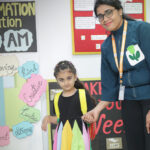
Preschool is a crucial stage in a child’s development. It’s the first step on their educational journey and a time when they begin to develop important social skills that will serve as the foundation for their future interactions with others. In this blog, we’ll explore 10 essential social skills that children learn in preschool, highlighting their significance and how they contribute to a child’s overall growth and development.
1. Sharing and Cooperation
Preschoolers learn the value of sharing and cooperation through various activities, such as group play and collaborative art projects. Learning to share toys and work together on tasks helps children understand the importance of compromise and teamwork. These skills are essential for building positive relationships and working effectively with others in the future.
2. Communication
Effective communication is a fundamental skill that preschoolers begin to develop. They learn to express their thoughts and feelings through words, gestures, and body language. Teachers encourage them to ask questions, express their needs, and engage in conversations with peers. Strong communication skills are vital for building relationships, resolving conflicts, and succeeding in school and later in life.
3. Empathy
Preschoolers start to develop empathy by recognizing and understanding the emotions of their classmates. Teachers emphasize the importance of kindness and consideration for others, encouraging children to support one another emotionally. This foundation of empathy is crucial for nurturing compassionate and socially aware individuals.
4. Problem-Solving
Preschool provides an environment where children encounter various challenges and obstacles, allowing them to develop problem-solving skills. Teachers guide them in finding creative solutions to conflicts and dilemmas, teaching them to think critically and independently. These skills are invaluable throughout life, helping individuals navigate complex situations and make informed decisions.
5. Patience
Patience is an attribute that cannot be overstated. In a world where immediate gratification is increasingly the norm, teaching children to be patient is an invaluable life lesson. Preschool helps children understand the importance of waiting, whether it’s their turn in a game or for something they desire. Patience cultivates self-control and the ability to handle frustration. It’s an essential quality for problem-solving and resilience, teaching children that good things come to those who can wait, work, and persevere. The ability to be patient is not just about getting what one wants; it’s about developing the mental fortitude to overcome challenges and setbacks, an invaluable trait that they will carry with them into adulthood.
6. Conflict Resolution
Preschoolers sometimes face disagreements and conflicts with their peers. In such situations, they learn the importance of resolving issues peacefully and finding common ground. Teachers help children understand that it’s okay to disagree but emphasize the need to find mutually satisfactory resolutions. Conflict resolution skills are crucial for maintaining healthy relationships and resolving disputes constructively.
7. Respect for Differences
Preschool is a diverse environment, where children encounter peers from various backgrounds and cultures. This exposure fosters an appreciation for diversity and teaches children to respect differences in ethnicity, beliefs, and abilities. Learning to embrace diversity at an early age promotes inclusivity and empathy, which are essential in our increasingly interconnected world.
8. Listening Skills
In preschool, children begin to understand the power of attentive listening. The ability to pay attention to what others are saying, comprehend their words, and respond appropriately is a skill that underpins all forms of effective communication. Teaching kids to listen not only fosters mutual respect but also helps them develop empathy as they learn to truly hear others’ feelings and needs. It’s an invaluable skill in building relationships, resolving conflicts, and becoming an active and empathetic member of any community.
9. Independence
Preschool encourages children to become more independent. They learn to perform tasks like dressing themselves, tidying up, and making choices. Independence builds self-confidence and self-reliance, which are essential for both social interactions and personal growth. It also fosters a sense of responsibility, which is important for becoming a responsible and accountable individual.
10. Friendship Building
Friendships formed during preschool often become some of the most enduring and cherished relationships in a person’s life. Learning how to make friends, how to approach others with kindness, and how to share experiences is not just about creating companionship but also about developing essential social bonds. These early friendships provide children with support systems, and through them, they learn the power of trust, loyalty, and shared experiences. Encouraging your child to form positive friendships during these formative years can set the tone for meaningful connections throughout their lives.
Preschool is a pivotal stage in a child’s life and the social skills learned during this time have a lasting impact. These skills not only lay the foundation for their academic success but also shape their character, values, and ability to navigate the complexities of the world. Through sharing, cooperation, communication, empathy, problem-solving, patience, conflict resolution, respect for differences, listening skills, independence, and friendship building, children acquire the tools they need to engage with others in a positive and constructive manner.
In summary, preschool is not just about early education; it’s a critical period for Social development. By nurturing these essential social skills, we empower our children to become well-adjusted, empathetic, and successful individuals who can communicate effectively, form meaningful relationships, and make positive contributions to the world around them.
Preschool is a critical time for your child’s growth and development. By addressing common preschool problems with patience, consistency, and love, you can guide them through this transformative period. So, cherish this transformative time in your child’s life, and continue to guide them as they embark on their journey towards a brighter and more socially aware future.
Happy learning for every Little Ginnie!










